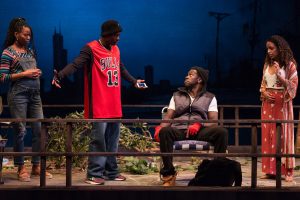Spirit Tops the Logistics in Cygnet’s Unfinished ‘Wind And the Breeze’
If we didn’t know better, we’d swear Sam has OCD — such is the fastidiousness with which he unfurls his orange safety flags and his folding chair on a bridge within view of Chicago’s Willis Tower (the big one better known as the Sears building). He and his grimy suburban hometown of Rockford are joined at both hips; he’s probably set up camp in that exact spot for the last 113 years to get the best view of Wacker Drive’s Fourth of July fireworks.
And it’s only February.

The roily Chicago sky is no match for Sam (Terrell Donnell Sledge) and his wealth of insight into the human condition. Photos by Karli Cadel Photography.
Indeed, wherever you hang your hat is the point behind Cygnet Theater Company’s current award-winning and world premiere The Wind and the Breeze. It’s a quite decent show, all right, puzzling over Sam’s attachment to Rockford even as it welcomes back a San Diego treasure to the stage. The liberal rap infusions suit this Nathan Alan Davis piece to a T, and Davis’ subtext characters are as diverse as they are logistically introduced.
Strangely, the most urgent question — the nature beneath Sam’s reluctance to leave Rockford and seek the vistas to which he’s eminently entitled — is the one Davis never quite answers.
He gives Sam a lot of help by way of a clutch of friends who recognize Sam for his broad-brush talents as a writer and a philosopher — talents he could peddle anywhere with a little grit and persistence. Ana chooses an ideal analogy to cajole him, regularly warbling Fast Car, Tracy Chapman’s great 1988 nod to young-adult wanderlust.
… [A] skyful of stars [is] home to billions of planets and the ideas that keep them aloft.
The headstrong Shantell, by-the-book cop Ronda and longtime friends Nia and Tea practically hand Sam the keys to that fast car; the latter two are on their way to Atlanta to pursue their hip-hop dream, and they urge Sam to come along.
But director Rob Lutfy’s excellent final scene supplies the explanation on Sam’s behalf. Wordlessly, Ronda shoots out the streetlights around Sam’s encampment, revealing a skyful of stars — home to billions of planets and the ideas that keep them aloft. Why, Sam would ask, is Rockford (or, by extension, Earth) any less a focal point for the pleasure and pain within the human experience as the universe commences its grit of day?
While the question is eminently rhetorical, the theatrical response isn’t exactly forthcoming. Sam’s rap background; Shantell’s lust for life; Ronda’s scrupulous devotion to the law; Ana’s general affection for Rockford: Davis has any number of tools to explore what the others see as Sam’s colossal blind spot, yet they’re largely left unattended. The characters supply plenty of sketches, but none of those sketches contributes substantially to the concept of hearth and home as Sam defines it. Doesn’t always make sense.

Nia and Shantell (from left, Chaz Shermil and Demetrius Clayton) school Sam (Terrell Donnell Sledge) in the world’s ways as Ana (Nadia Guevara) takes it in.
Sean Fanning’s set is an exercise in proportion acumen — Willis Tower is well distant from Sam’s perch, yet the building’s ceaseless bulk peskily reminds the characters what planet they’re on. R. Craig Wolf’s lights (with an assist from Christina J. Martin) combine with Steven Leffue’s sound to render an exceedingly gloomy skyline above what’s sometimes an exceedingly gloomy city (full disclosure: Bar none, it’s still the best theater town in the country).
John Milton’s poem On His Blindness is the one that reads, “They also serve who only stand and wait”— a shout-out to that part of humanity’s stake in the universe no matter its disability. Sam’s not sick, and neither are his friends; with some major subtextual rethought, Davis could bolster their already compelling case to that effect.
This review is based on the performance of May 20. The Wind and the Breeze runs through June 10 at Cygnet Theatre, 4040 Twiggs St. in Old Town. $39-$58. (619) 337-1525, cygnettheatre.com.

Martin Jones Westlin, principal at editorial consultancy Words Are Not Enough and La Jolla Village News editor emeritus, has been a theater critic and editor/writer for 25 of his 47 years…
More…
